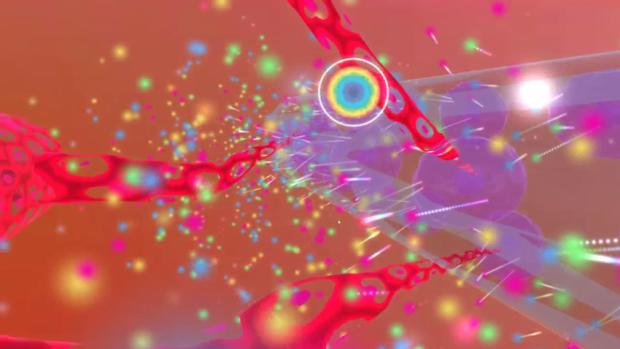NYU Tandon’s VR App Debuts at SXSW, Aims to Make Blood Cells More Fun Than Bloodshed In Video Games

Tandon Labs is an immersion into the research of professor Alesha B. Castillo. Users are virtually dropped through a microscope’s eyepiece to the interstice between bone and capillary-forming endothelial cells.
As South by Southwest’s annual Gaming Expo opens next week, big-name game companies will be vying for attention for their newest releases … alongside a virtual reality app that can make bone and capillary-forming endothelial cells as exciting as racing and shooting. It should come as no surprise that the app is the work of university students and faculty — the NYU Tandon School of Engineering, to be specific. Their goal: to attract future engineers and scientists as hyped on STEM as they are.
High school graduates admitted to the class of 2021 at the NYU Tandon School of Engineering will find a 3D cardboard viewer in their acceptance packages that will take them on a journey to a microscopic, intracellular world — a virtual reality (VR) game environment where they can watch cells communicate using chemical signals.
NYU Tandon will debut the experience, called Tandon Labs, at the SXSW Gaming Expo, Thursday, March 16 to Saturday, March 18, 2017. NYU Tandon is the only school invited to showcase a VR game that is being used as an admissions tool, but its Tandon Labs is available to all as a free download for Android and Apple.
The journey is an immersion — literally — into the research of Assistant Professor of Mechanical and Aerospace Engineering Alesha B. Castillo. Users visit her Laboratory for Mechanobiology and Regenerative Medicine, where they are virtually dropped through a microscope’s eyepiece to the interstice between bone and capillary-forming endothelial cells. There they will enjoy a colorful close-up view of the process by which bone cells use chemical signals called paracrines to enjoin capillary endothelial cells to commence angiogenesis — the formation of new blood vessels.
“Little is known about the interaction between different cell types within the bone injury environment,” said Castillo. “We started this research to look specifically at how bone cells might control angiogenesis using signaling molecules.”
The app was designed by artist and NYU Tandon digital media faculty member Mark Skwarek, who heads the NYU Mobile Augmented Reality Lab, and Integrated Digital Media graduate student Siyuan Qiu. Working with Castillo, they meticulously recreated the cells and movement that researchers see through the microscope. That same attention to detail marked last year’s inaugural voyage, called Tandon Vision, also designed in the Mobile Augmented Reality Lab: a trip to Mars featuring a robot built by the school’s Lunabotics student club and featuring real images from NASA.
Skwarek said that this year’s app is designed to be compatible with 3D VR viewers Oculus Rift and VIVE. The Tandon Labs VR experience includes a gaming element: Users can increase the speed at which capillaries grow and extend toward bone cells by pressing the button on their cardboard viewer when visual cues representing the rhythm of ambient music cross a floating marker. The action is accompanied by a dreamlike soundtrack provided by musician, artist, and Associate Professor R. Luke DuBois, who co-directs NYU Tandon’s Integrated Digital Media Program.
NYU Tandon Dean Katepalli R. Sreenivasan said that virtual reality gives prospective students the opportunity to experience firsthand the exciting research being done at the NYU Tandon School of Engineering.
“Immersive experiences like Tandon Labs allow students to envision themselves as a part of our world-class research community,” said Sreenivasan. “But, just as importantly, it evinces our commitment to taking engineering ‘out of the box’ by encouraging experimentation and collaboration between disparate communities and disciplines. Tandon Labs is an example of how great ideas spring from thinking beyond silos, labels, and definitions.”
The project also reflects Tandon’s emphasis on diversity and inclusion. Last year 37 percent of Tandon freshman were women, historically the largest percentage of women in an incoming Tandon class. By contrast, women made up just 21.4 percent of undergraduates enrolled in engineering programs nationwide. Forty-nine percent of incoming freshmen at Tandon last year belonged to underrepresented STEM populations (African American, Hispanic, Native American and female).
The Tandon Labs experience is narrated by female undergraduate student Simone Brown and features two women student researchers. Five of the seven members of the Tandon Vision team are women, including the project leads in the Office of Enrollment Management.
“Tandon Labs is a great tool for attracting more prospective and newly admitted students,” said Elizabeth Ensweiler, director of enrollment management at the school. “We hope Tandon Labs inspires more underrepresented STEM populations to start their journey with STEM at NYU Tandon School of Engineering.”
“It is still not easy for students to find female mentors, so it is critically important that we have more women in the field — and that women have a place at the table,” said Castillo.
For more information, view a video of the Tandon Labs immersive 3D experience.
Note: Images available at http://dam.engineering.nyu.edu/?c=1922&k=e066eae597
About the New York University Tandon School of Engineering
The NYU Tandon School of Engineering dates to 1854, the founding date for both the New York University School of Civil Engineering and Architecture and the Brooklyn Collegiate and Polytechnic Institute (widely known as Brooklyn Poly). A January 2014 merger created a comprehensive school of education and research in engineering and applied sciences, rooted in a tradition of invention and entrepreneurship and dedicated to furthering technology in service to society. In addition to its main location in Brooklyn, NYU Tandon collaborates with other schools within NYU, the country’s largest private research university, and is closely connected to engineering programs at NYU Abu Dhabi and NYU Shanghai. It operates Future Labs focused on start-up businesses in downtown Manhattan and Brooklyn and an award-winning online graduate program.

